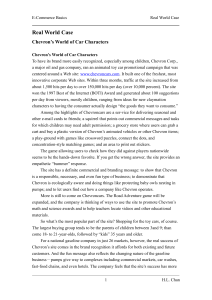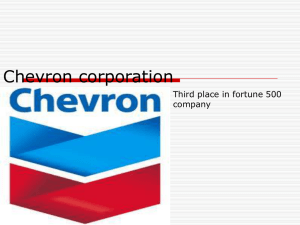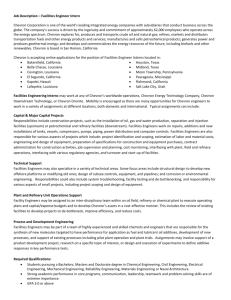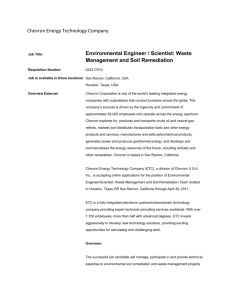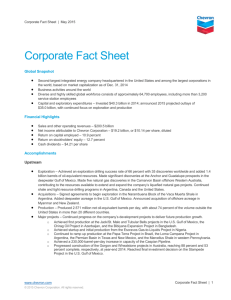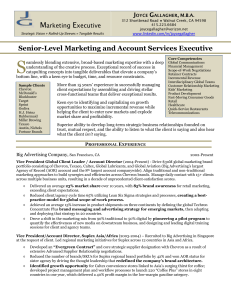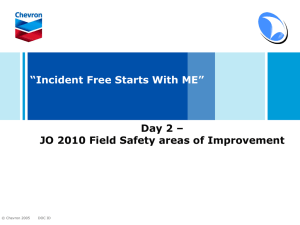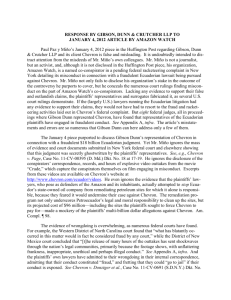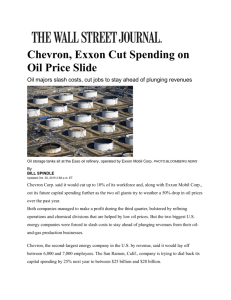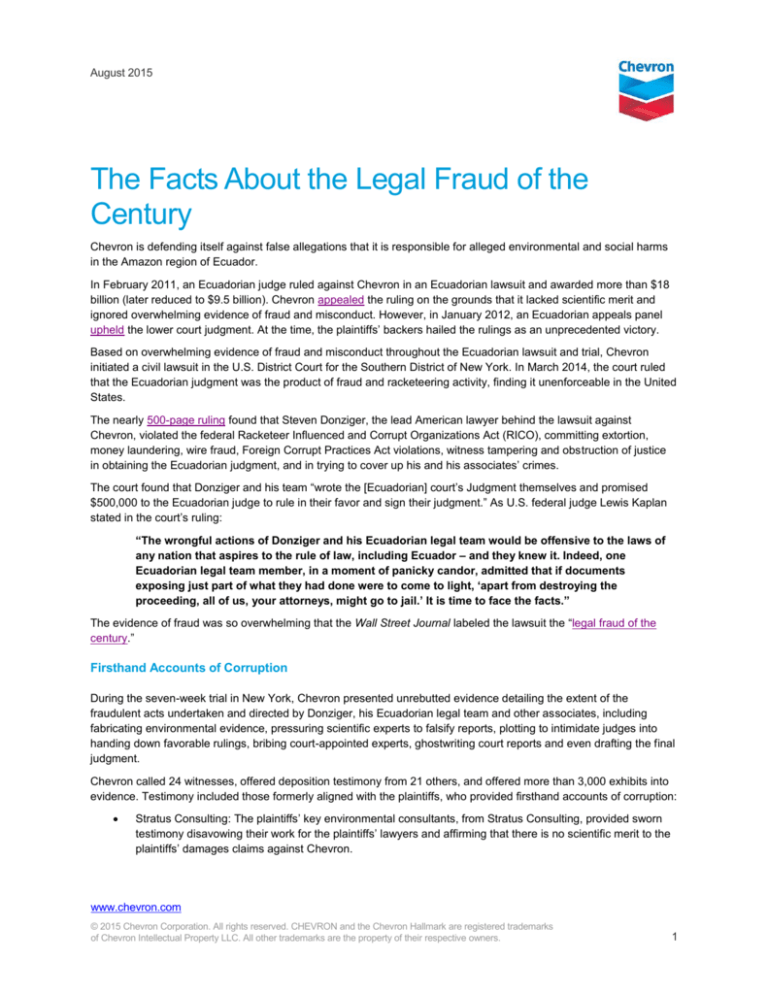
August 2015
The Facts About the Legal Fraud of the
Century
Chevron is defending itself against false allegations that it is responsible for alleged environmental and social harms
in the Amazon region of Ecuador.
In February 2011, an Ecuadorian judge ruled against Chevron in an Ecuadorian lawsuit and awarded more than $18
billion (later reduced to $9.5 billion). Chevron appealed the ruling on the grounds that it lacked scientific merit and
ignored overwhelming evidence of fraud and misconduct. However, in January 2012, an Ecuadorian appeals panel
upheld the lower court judgment. At the time, the plaintiffs’ backers hailed the rulings as an unprecedented victory.
Based on overwhelming evidence of fraud and misconduct throughout the Ecuadorian lawsuit and trial, Chevron
initiated a civil lawsuit in the U.S. District Court for the Southern District of New York. In March 2014, the court ruled
that the Ecuadorian judgment was the product of fraud and racketeering activity, finding it unenforceable in the United
States.
The nearly 500-page ruling found that Steven Donziger, the lead American lawyer behind the lawsuit against
Chevron, violated the federal Racketeer Influenced and Corrupt Organizations Act (RICO), committing extortion,
money laundering, wire fraud, Foreign Corrupt Practices Act violations, witness tampering and obstruction of justice
in obtaining the Ecuadorian judgment, and in trying to cover up his and his associates’ crimes.
The court found that Donziger and his team “wrote the [Ecuadorian] court’s Judgment themselves and promised
$500,000 to the Ecuadorian judge to rule in their favor and sign their judgment.” As U.S. federal judge Lewis Kaplan
stated in the court’s ruling:
“The wrongful actions of Donziger and his Ecuadorian legal team would be offensive to the laws of
any nation that aspires to the rule of law, including Ecuador – and they knew it. Indeed, one
Ecuadorian legal team member, in a moment of panicky candor, admitted that if documents
exposing just part of what they had done were to come to light, ‘apart from destroying the
proceeding, all of us, your attorneys, might go to jail.’ It is time to face the facts.”
The evidence of fraud was so overwhelming that the Wall Street Journal labeled the lawsuit the “legal fraud of the
century.”
Firsthand Accounts of Corruption
During the seven-week trial in New York, Chevron presented unrebutted evidence detailing the extent of the
fraudulent acts undertaken and directed by Donziger, his Ecuadorian legal team and other associates, including
fabricating environmental evidence, pressuring scientific experts to falsify reports, plotting to intimidate judges into
handing down favorable rulings, bribing court-appointed experts, ghostwriting court reports and even drafting the final
judgment.
Chevron called 24 witnesses, offered deposition testimony from 21 others, and offered more than 3,000 exhibits into
evidence. Testimony included those formerly aligned with the plaintiffs, who provided firsthand accounts of corruption:
Stratus Consulting: The plaintiffs’ key environmental consultants, from Stratus Consulting, provided sworn
testimony disavowing their work for the plaintiffs’ lawyers and affirming that there is no scientific merit to the
plaintiffs’ damages claims against Chevron.
www.chevron.com
© 2015 Chevron Corporation. All rights reserved. CHEVRON and the Chevron Hallmark are registered trademarks
of Chevron Intellectual Property LLC. All other trademarks are the property of their respective owners.
1
-
Alberto Guerra: A former Ecuadorian judge who once presided over the case testified that the judge who
issued the judgment against Chevron was promised a half-million dollar bribe from the plaintiffs’ lawyers in
exchange for ghostwriting the judgment in the plaintiffs’ favor.
-
In sworn declarations (here and here), senior Stratus executives detail the role the firm and the
plaintiffs' lawyers played in ghostwriting a damages report for a court-appointee, which serves as
an evidentiary basis of the 2011 judgment against Chevron in Ecuador. In their declarations, the
executives state that "Stratus is not aware of any scientific evidence that people in the former
concession area are drinking water contaminated with petroleum" and that they are “not aware of
any scientific data that shows that any adverse health effects are caused by contamination from
petroleum operations in the Oriente.”
Guerra, who presided over the case when it was first filed in 2003, revealed that he was paid
thousands of dollars by the plaintiffs' lawyers and a subsequent judge, Nicholas Zambrano, for
illegally ghostwriting judicial orders issued by Zambrano and steering the case in the plaintiffs'
favor. Guerra, who is no longer a judge, attested that the plaintiffs' lawyers were permitted to draft
the judgment in their own favor after they promised to pay Zambrano a $500,000 bribe out of the
judgment's enforcement proceeds, and that Guerra then reviewed the plaintiffs' lawyers’ draft for
Zambrano before the judge issued it as his own.
Burford Capital: One of the plaintiffs’ largest financial backers provided sworn testimony documenting fraud
and other misconduct on the part of the plaintiffs’ lawyers to secure funding.
-
In January 2013, it was revealed that Burford had halted its funding and accused the plaintiffs’
lawyers of fraud and other misconduct in connection with the case. On April 17, 2013, Burford
provided a sworn declaration outlining the firm’s knowledge of the plaintiffs’ lawyers’ misconduct
and testifying that the proceeding is irredeemably tainted by fraud. Christopher Bogart, Burford's
chief executive officer, said, “Burford stands by its clients in the face of aggressive litigation tactics
by their opponents, but Burford does not sit still for being deceived or defrauded and has no
interest in profiting from such conduct.”
The March 2014 RICO ruling prohibits Donziger and his associates from seeking to enforce the Ecuadorian judgment
in the United States and further prohibits them from profiting from their illegal acts.
After learning of the extent of the fraud, described in detail by the U.S. federal court, many of Donziger’s former
supporters, including funders, investors, scientific experts, and legal counsel have abandoned the scheme.
Other Jurisdictions Also Questioning Ecuadorian Judgment
The Ecuadorian judgment is being questioned in other jurisdictions as well: After reviewing extensive evidence of the
fraud and corruption marring the Ecuadorian proceedings, the Permanent Court of Arbitration in The Hague has
ordered the Republic of Ecuador to suspend enforcement of any judgment against Chevron until it resolves the claim
Chevron has brought against Ecuador for violations of its investment treaty with the U.S. in connection with the case.
Disregarding this order, the government of Ecuador has done nothing to suspend enforcement efforts and, in fact,
has embarked on a global campaign against Chevron in an attempt to discredit the international arbitration system.
Separately, the tribunal issued a Partial Award, finding that the Settlement and Release Agreements that Chevron
subsidiary Texaco Petroleum Co. (TexPet) entered into with the government of Ecuador released the company and
its affiliates of any liability for all public interest or collective environmental claims. This award confirms that the
fraudulent claims against Chevron should not have been brought in the first place.
In addition, Brazil’s Federal Prosecutor’s Office has issued a recommendation to the country’s Superior Court of
Justice that the $9.5 billion fraudulent Ecuadorian judgment against Chevron Corporation not be recognized for
enforcement. In an opinion requested by Brazil’s Superior Court of Justice, Deputy Prosecutor General Nicolao Dino
found that the Ecuadorian judgment against Chevron was “issued irregularly, especially under uncontested acts of
corruption” and that recognizing it would violate Brazilian and “international public order.” Under international and
www.chevron.com
© 2015 Chevron Corporation. All rights reserved. CHEVRON and the Chevron Hallmark are registered trademarks
of Chevron Intellectual Property LLC. All other trademarks are the property of their respective owners.
2
Brazilian law, foreign judgments that violate public order, including the right to due process, may not be recognized in
Brazil.
Texaco’s Successful Remediation
Chevron has never conducted oil production operations in Ecuador, and its subsidiary Texaco Petroleum Co.
(TexPet) fully remediated its share of environmental impacts arising from oil production operations prior to 1992.
After the remediation was certified by all agencies of the Ecuadorian government responsible for oversight, TexPet
received a complete release from Ecuador's national, provincial and municipal governments prior to being acquired
by Chevron in 2001. Ecuador's state-owned oil company, Petroecuador, was the 62.5 percent majority owner of the
consortium in which TexPet participated until 1992 and has been the sole owner of greatly expanded oil operations
over the past two decades. Petroecuador has not remediated its majority share of pre-1992 impacts and has
amassed a poor environmental record. All remaining environmental conditions in the region are the sole legal
responsibility of Petroecuador and in December 2011, Petroecuador announced a $70 million remediation program
that would address the balance of the necessary clean-up.
Chevron has thoroughly investigated the plaintiffs’ lawyers’ claims of social, health and environmental harms. At
Chevron’s request, many of the world’s top toxicologists, epidemiologists, ecologists, anthropologists and
geoscientists have considered the evidence—including more than 1,500 environmental samples—and have
concluded that there is no scientific support for the claims. To the contrary, all of the legitimate evidence presented to
the Ecuadorian court demonstrates that former Texaco Petroleum Company operations present no risk to residents’
health and have not resulted in any significant impact to groundwater, drinking water, biodiversity, or indigenous
culture. The plaintiffs’ lawyers’ continued claims to the contrary, in the face of this overwhelming scientific evidence,
are untrue.
Conclusion
Chevron does not believe that the Ecuador ruling is enforceable in any court that observes the rule of law. The
recent RICO decision validates this belief. The company will continue to seek to hold the perpetrators of this fraud
accountable. Chevron will also continue to pursue relief against Ecuador in our pending arbitration. Chevron will resist
any enforcement effort and seek to hold anyone who would attempt to enforce the fraudulent judgment in another
jurisdiction accountable to the full extent of the law.
For a more detailed account of Chevron’s position on this matter, please visit www.chevron.com/ecuador or
http://theamazonpost.com.
www.chevron.com
© 2015 Chevron Corporation. All rights reserved. CHEVRON and the Chevron Hallmark are registered trademarks
of Chevron Intellectual Property LLC. All other trademarks are the property of their respective owners.
3

